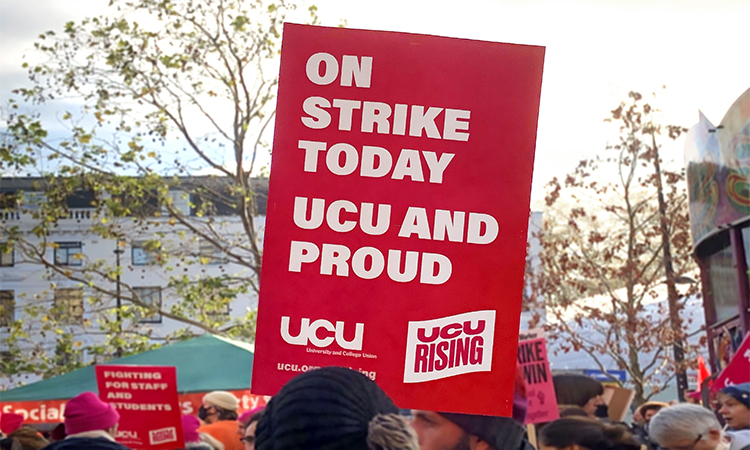
Image: Fiona McIntyre for Research Professional News
Members support more strikes in two national ballots, despite recent progress in negotiations
University and College Union members have once again backed industrial action in two national ballots, leaving universities at risk of disruption for a further six months.
Despite recent progress in the disputes over the Universities Superannuation Scheme and the pay and conditions row, UCU members gave their backing to a further six months of potential strike action in two national ballots, which ran from 22 February to 31 March.
On 3 April the union revealed that in the ballot over pensions, turnout was 58.4 per cent and 89 per cent backed strike action. In the ballot over pay and working conditions, turnout was 56.4 per cent and 85.6 per cent voted for strikes.
It means the UCU has again reached the legal threshold of 50 per cent turnout and staff at 150 universities across the UK could go on strike. A swathe of strikes have already hit universities this year in February and March as part of the same disputes.
Jo Grady, general secretary of the UCU, said the results showed vice-chancellors that “we will win any strike action ballot we call”.
“The numbers voting in favour of action have only increased, and if employers were in any doubt about the determination of university staff to save the sector, they can be no more,” she said. “Importantly, we have shown university bosses that it is staff who are in the driving seat.”
Members also backed action short of a strike, and the UCU said it would prepare to serve notice for a marking and assessment boycott.
There have been hopes recently that the long-running rows could soon be resolved. Voting in the re-ballot began before employers made offers last month in both disputes that would restore pension benefits to their pre-April 2022 levels and address non-pay issues such as workload, casualisation and equality pay gaps.
A proposal for a pay rise of between 5 and 8 per cent is being implemented by employers despite being rejected by the union. The USS valuation process will require a statutory consultation of pension scheme members before any settlement.
However, the union and employers are in a stand-off over talks over working conditions with the University and College Employer’s Association seeking an assurance of no further industrial action before discussions can proceed. Raj Jethwa, chief executive of Ucea, said the result was “disappointing”.
He added that Ucea was “fully committed to working with the trade unions” on implementing the terms of reference for talks on working conditions agreed by employers and the union through Acas-mediated talks.
“This is an opportunity to address some important issues, building on the extensive good practice which already exists in the sector,” he said. “However, the threat of industrial action, particularly a marking and assessment boycott that aims to target students, puts these talks in jeopardy.”
A spokesperson for Universities UK, which represents 340 employers in negotiations over the USS, said: “So much positive progress has been made on USS, and the timescale for key decisions has been set. UCU’s own negotiators recognise there is nothing to be gained at this stage from further industrial action, something we expect the wider UCU membership will recognise too.”






